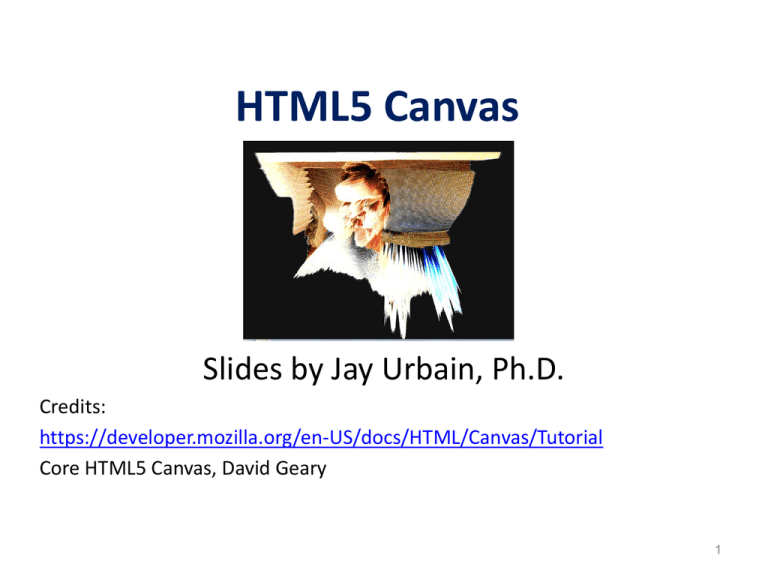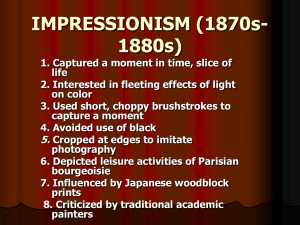HTML5: Drawing using the Canvas
advertisement

HTML5 Canvas
Slides by Jay Urbain, Ph.D.
Credits:
https://developer.mozilla.org/en-US/docs/HTML/Canvas/Tutorial
Core HTML5 Canvas, David Geary
1
HTML5 Graphics
• The web has always been a visual medium, but a
restricted one at best.
• HTML developers were limited to CSS and JavaScript
in order to produce animations or visual effects, or
they would have to rely on a plugin like Flash.
2
HTML5 Graphics
• With the addition of technologies like the canvas
element, Web GL, and SVG images, this is no longer
the case!
• Many new features which deal with graphics on the
web: 2D Canvas, WebGL, SVG, 3D CSS transforms,
and SMIL.
3
Performance
• JavaScript engines have become fast enough to run 3D games
and manipulate video in realtime.
• GPU accelerated compositing is being implemented in many
browsers, meaning that even CSS transitions and transforms
very smooth.
4
Apple HTML5 Showcases
• http://www.apple.com/html5/
5
http://www.chromeexperiments.com/
6
http://chrome.angrybirds.com/
7
http://html5rocks.com/
http://www.html5rocks.com/en/tutorials/#type:demo
http://studio.html5rocks.com/samples/globe/index.html
8
Canvas
http://www.w3schools.com/tags/ref_canvas.asp
•
•
•
•
•
•
•
•
Basic usage
Drawing shapes
Using images
Applying styles and colors
Transformations
Compositing
Basic animations
Optimizing the canvas
9
<canvas>
•
•
•
•
2D drawing platform for the browser
No plugins needed: just HTML and JavaScript
Represented by <canvas> element in an HTML5 document
<canvas> element is only a container for graphics
– You must use a script to actually draw the graphics
<canvas id=“my_canvas_id” width=“150” height”150”></canvas>
10
Rendering Context
• <canvas> creates a fixed size drawing surface that exposes one or more
rendering contexts, which are used to create and manipulate the content:
– 2d context, 3d context
• The <canvas> is initially blank. To draw something, a script needs to access
the rendering context and draw on it.
• The <canvas> element has a DOM method called getContext() used to
obtain the rendering context and its drawing functions:
// get reference to <canvas> element
var canvas = document.getElementById(‘my_canvas’);
// get rendering context
var ctx = canvas.getContet(‘2d’);
11
Fallback for Old Browsers
•
Fallback content can be displayed in browsers that do not support <canvas>:
<canvas id=“my_canvas_id” width=“150” height”150”>
<img src=“images/nocanvas.png” width=“150” height”150” alt=“” />
<em>Canvas is not supported!</em>
</canvas>
•
Scripts can also check for <canvas> support:
// get reference to <canvas> element
var canvas = document.getElementById(‘my_canvas’);
if( canvas.getContext() ) {
var ctx = canvas.getContet(‘2d’);
// drawing code…
} else {
// canvas unsupported code…
}
12
Canvas grid or coordinate space
• Normally 1 unit in the grid corresponds to 1 pixel on the
canvas.
13
Drawing Rectangles
• Canvas only supports one primitive geometric shape –
rectangles.
– All other shapes must be created by combining one or more paths.
– Canvas provides a collection of path drawing function which make it
possible to compose very complex shapes.
• Functions that draw Rectangles – all three rectangle functions
draw immediately to the canvas (unlike path functions).
– fillRect(x, y, width, height): Draws a filled rectangle
– strokeRect(x, y, width, height): Draws a rectangular outline
– clearRect(x, u, width, height): Clears the specified area and makes it
fully transparent.
14
Drawing Rectangles
<!DOCTYPE html>
<html>
<body>
<canvas id="myCanvas" width="150" height="150" style="border:1px solid #000000;">
Your browser does not support the HTML5 canvas tag.
</canvas>
<script>
function draw() {
var ctx = document.getElementById('myCanvas').getContext('2d');
ctx.fillRect(25,25,100,100);
ctx.clearRect(45,45,60,60);
ctx.strokeRect(55, 55, 40, 40);
}
draw();
</script>
</body>
15
</html>
Intersecting rectangles with alpha
<html>
transparency
<head>
<script type="application/javascript">
function draw() {
var canvas = document.getElementById('canvas');
if (canvas.getContext) {
var ctx = canvas.getContext("2d");
ctx.fillStyle = "rgb(200,0,0)";
ctx.fillRect (10, 10, 55, 50);
ctx.fillStyle = "rgba(0, 0, 200, 0.5)";
ctx.fillRect (30, 30, 55, 50);
}
}
</script></head>
<body onload="draw();">
<canvas id="canvas" width="150" height="150"></canvas>
</body>
</html>
16
Drawing with Paths
• Internally, paths are stored as a list of sub-paths (lines, arcs, etc.) which
together form a shape.
• Steps for drawing paths:
1. beginPath() – Resets lists of sub-paths.
2. moveTo() and a set of lineTo() methods – Specify the paths to be drawn
by creating a list of coordinates.
–
3.
4.
Besides lines, arcs, bezier, and quadratic curves can also be drawn.
closePath() – Tries to close the path by drawing a straight line from the
current point to the start. If the shape has already been closed or there’s
only one point in the list, this function does nothing.
stroke() or fill() methods = Draws the shape to the canvas. stroke() is used
to draw an outline shape, fill() is used to paint a solid shape.
17
Creating a triangle with Paths
<html>
<head>
<script type="application/javascript">
function draw() {
var canvas = document.getElementById('canvas');
if (canvas.getContext) {
var ctx = canvas.getContext("2d");
ctx.beginPath();
ctx.moveTo(75,50);
ctx.lineTo(100,75);
ctx.lineTo(100,25);
ctx.fill();
}
}
</script>
</head>
<body onload="draw();">
<canvas id="canvas" width="150" height="150"></canvas>
</body>
</html>
18
Drawing a complex shape with Paths
arc(x, y, radius, startAngle,
<html>
endAngle, anticlockwise)
<head>
<script type="application/javascript">
Angles in the arc function are
function draw() {
var canvas = document.getElementById('canvas');
measured in radians, not
if (canvas.getContext) {
degrees. To convert degrees to
var ctx = document.getElementById('canvas').getContext('2d');
radians:
ctx.beginPath();
var radians =
ctx.arc(75,75,50,0,Math.PI*2,true); // Outer circle
(Math.PI/180)*degrees.
ctx.moveTo(110,75);
ctx.arc(75,75,35,0,Math.PI,false); // Mouth (clockwise)
ctx.moveTo(65,65);
ctx.arc(60,65,5,0,Math.PI*2,true); // Left eye
ctx.moveTo(95,65);
ctx.arc(90,65,5,0,Math.PI*2,true); // Right eye
ctx.stroke();
}
}
</script>
</head>
<body onload="draw();"><canvas id="canvas" width="150" height="150"></canvas>
</body></html>
19
Draw Text
<!DOCTYPE html>
<html>
<body>
<canvas id="myCanvas" width="150" height="150" style="border:1px solid #000000;">
Your browser does not support the HTML5 canvas tag.
</canvas>
<script>
function draw() {
ctx.font="20px Arial";
ctx.fillText("SE2840 Rocks!", 7, 50);
ctx.strokeText("Mother would be proud", 7, 100);
}
draw();
</script>
</body>
</html>
20
Other graphics primitives…
Bezier and quadratic curves
• Used to draw complex organic shapes.
• quadraticCurveTo(cp1x, cp1y, x, y) // BROKEN in Firefox 1.5
• bezierCurveTo(cp1x, cp1y, cp2x, cp2y, x, y)
Rectangles
• rect(x, y, width, height)
Making combinations
• No limitation to the amount or type of paths you can use to create a
shape.
21
Importing and Drawing Images
Importing images:
1. Need a reference to a JavaScript Image object or other
canvas element as a source. (Note: not possible to use
images by simply providing a URL/path to them).
2. Draw the image on the canvas using the drawImage()
function.
22
Using Images
1. Using images on the same page
– Access all images: document.images()
– document.getElementsByTagName()
– document.getElementById()
2. Using images from other domains
– Use the crossOrigin attribute on an Image - you can request
permission to load an image from another domain for use in your call
to drawImage()
3. Using other canvas elements
– document.getElementsByTagName()
– document.getElementById()
4. Creating new Image object (from scratch) in our script
23
Creating a new image from scratch
• var img = new Image(); // Create new img element
• img.src = 'myImage.png'; // Set source path
• Use onload event handler to wait for image to finish loading before
calling drawImage:
img.onload = function(){
// execute drawImage statements here
};
img.src = 'myImage.png'; // Set source path
24
drawImage()
<script type="text/javascript">
function draw(){
var ctx = document.getElementById('canvas').getContext('2d');
// Create image object
var img = new Image();
img.src = 'images/backdrop.png'; // backdrop
// Wait for image to load
img.onload = function(){
ctx.drawImage(img,0,0);
// Draw lines
ctx.beginPath();
ctx.moveTo(30,96);
ctx.lineTo(70,66);
ctx.lineTo(103,76);
ctx.lineTo(170,15);
ctx.stroke();
};
file://D:/Dropbox/jpassionHTML5/html5_ca
}
nvas/samples_html5/02b_image_create_I
</script>
mage_object.html
25
Scaling
•
DrawImage method variant adds two new parameters and it allows us to place
scaled images on the canvas:
drawImage(image, x, y, width, height)
function draw() {
var ctx = document.getElementById('canvas').getContext('2d');
var img = new Image();
img.onload = function(){
for (var i=0;i<4;i++){
for (var j=0;j<3;j++){
ctx.drawImage(img,j*50,i*38,50,38);
}
}
};
img.src = '/files/4533/rhino.jpg';
}
D:\Dropbox\jpassionHTML5\html5_canvas\
samples_html5\02c_image_scaling.html
26
Slicing
• drawImage method variant has eight new parameters.
drawImage(image, sx, sy, sWidth, sHeight, dx, dy, dWidth, dHeight)
function draw() {
var ctx = document.getElementById('canvas').getContext('2d');
// Draw slice
ctx.drawImage(
document.getElementById('source'),33,71,104,124,21,20,87,104);
// Draw frame
ctx.drawImage(
document.getElementById('frame'),0,0);
}
D:\Dropbox\jpassionHTML5\html5_canvas\
samples_html5\02d_image_slicing.html
27







